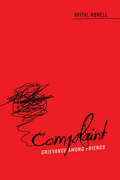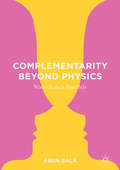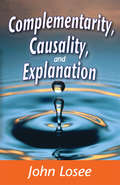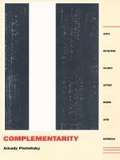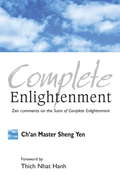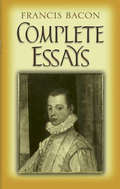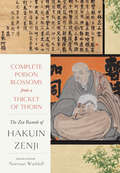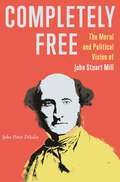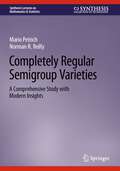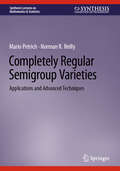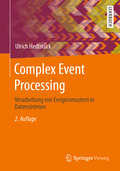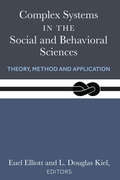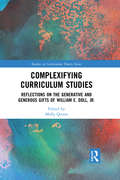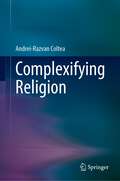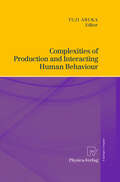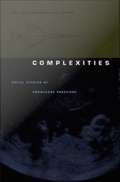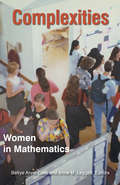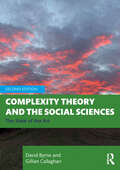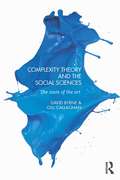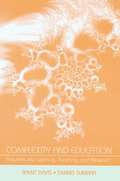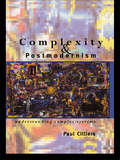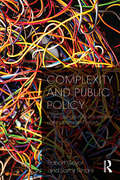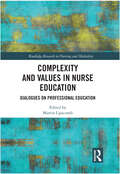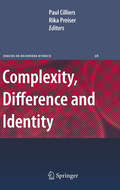- Table View
- List View
Complaint: Grievance among Friends
by Avital Ronell"It is not, nor it cannot come to good. But break, my heart, for I must hold my tongue." Thus spoke Hamlet, one of the great kvetchers of literature. Every day, gripers challenge our patience and compassion. Yet Pollyannas rile us up with their grotesque contentment and unfathomable rejection of protest. Avital Ronell considers how literature and philosophy treat bellyachers, wailers, and grumps--and the complaints they lavish on the rest of us. Combining her trademark jazzy panache with a fearless range of readings, Ronell opens a dialog with readers that discusses thinkers with whom she has directly engaged. Beginning with Hamlet, and with a candid awareness of her own experiences, Ronell proceeds to show how complaining is aggravated, distracted, stifled, and transformed. She moves on to the exemplary complaints of Friedrich Nietzsche, Hannah Arendt, and Barbara Johnson and examines the complaint-riven history of deconstruction. Infused with the author's trademark wit, Complaint takes friends, colleagues, and all of us on a courageous philosophical journey.
Complementarity Beyond Physics: Niels Bohr's Parallels
by Arun BalaIn this study Arun Bala examines the implications that Niels Bohr’s principle of complementarity holds for fields beyond physics. Bohr, one of the founding figures of modern quantum physics, argued that the principle of complementarity he proposed for understanding atomic processes has parallels in psychology, biology, and social science, as well as in Buddhist and Taoist thought. But Bohr failed to offer any explanation for why complementarity might extend beyond physics, and his claims have been widely rejected by scientists as empty speculation. Scientific scepticism has only been reinforced by the naïve enthusiasm of postmodern relativists and New Age intuitionists, who seize upon Bohr’s ideas to justify anti-realist and mystical positions. Arun Bala offers a detailed defence of Bohr’s claim that complementarity has far-reaching implications for the biological and social sciences, as well as for comparative philosophies of science, by explaining Bohr’s parallels as responses to the omnipresence of grown properties in nature.
Complementarity, Causality and Explanation
by John LoseePhilosophers have discussed the relationship of cause and effect from ancient times through our own. Prior to the work of Niels Bohr, these discussions presupposed that successful causal attribution implies explanation. The success of quantum theory challenged this presupposition. Bohr introduced a principle of complementarity that provides a new way of looking at causality and explanation.In this succinct review of the history of these discussions, John Losee presents the philosophical background of debates over the cause-effect relation. He reviews the positions of Aristotle, Rene Descartes, Isaac Newton, David Hume, Immanuel Kant, and John Stuart Mill. He shows how nineteenth-century theories in physics and chemistry were informed by a dominant theory of causality and how specific developments in physics provided the background for the emergence of quantum theory.Problems created for the causality implies explanation thesis by the emergence of quantum theory are reviewed in detail. Losee evaluates Bohr's proposals to apply a principle of complementarity within physics, biology, and psychology. He also discusses the feasibility of using complementarity as a principle of interpretation within Christian theology. This volume, which includes an in-depth index, is an essential addition to the libraries of advanced undergraduate and graduate students, philosophers, and those interested in causality and explanation.
Complementarity: Anti-Epistemology after Bohr and Derrida
by Arkady PlotnitskyMany commentators have remarked in passing on the resonance between deconstructionist theory and certain ideas of quantum physics. In this book, Arkady Plotnitsky rigorously elaborates the similarities and differences between the two by focusing on the work of Niels Bohr and Jacques Derrida. In detailed considerations of Bohr's notion of complementarity and his debates with Einstein, and in analysis of Derrida's work via Georges Bataille's concept of general economy, Plotnitsky demonstrates the value of exploring these theories in relation to each other.Bohr's term complementarity describes a situation, unavoidable in quantum physics, in which two theories thought to be mutually exclusive are required to explain a single phenomenon. Light, for example, can only be explained as both wave and particle, but no synthesis of the two is possible. This theoretical transformation is then examined in relation to the ways that Derrida sets his work against or outside of Hegel, also resisting a similar kind of synthesis and enacting a transformation of its own.Though concerned primarily with Bohr and Derrida, Plotnitsky also considers a wide range of anti-epistemological endeavors including the work of Nietzsche, Bataille, and the mathematician Kurt Gödel. Under the rubric of complementarity he develops a theoretical framework that raises new possiblilities for students and scholars of literary theory, philosophy, and philosophy of science.
Complete Enlightenment
by Master Sheng YenComplete Enlightenment is the first authoritative translation and commentary on The Sutra of Complete Enlightenment, a central text that shaped the development of East Asian Buddhism and Ch'an (Chinese Zen). The text is set in the form of a transcription of discussions between the Buddha and the twelve enlightened beings(bodhisattvas), who question him on all aspects of spiritual practice.This new translation preserves all the liveliness and nuance of the text in the original Chinese. The sutra's ancient wisdom is brought to life by the commentaries of Master Sheng Yen, one of the most revered living Buddhist masters in the Ch'an lineage. This is truly a manual for the spiritual journey toward complete enlightenment, providing the key to the deep, poetic, and practical meanings of the scripture.
Complete Essays (Dover Value Editions Ser.)
by Francis BaconWise, witty, and immensely readable, these short but thought-provoking discourses examine life, death, and everything in between: truth, adversity, love, superstition, health, ambition, fame, and many other timeless topics. Francis Bacon — renowned as a scientist, scholar, and statesman — regarded the world as a puzzle to be solved. During the transition between the Renaissance and the early modern era, his methods of inductive reasoning exercised an enormous influence on seventeenth-century Europe. In these essays, Bacon effectively applied his scientific approach of observation and interpretation to human behavior.Bacon originally intended the essays as personal notes, to be shared only with a few friends. He was persuaded to publish an initial installment in 1597, and the volume's continuing popularity led to his revised and enlarged version of 1625. This edition features all 58 essays of the later version, offering a splendid combination of style and substance.
Complete Poison Blossoms from a Thicket of Thorn: The Zen Records of Hakuin Ekaku
by Hakuin ZenjiFollowing his translation of just over half the original text in 2014, Norman Waddell presents the complete teaching record of Zen master Hakuin, now available in English with extensive explanations, notes, and even the wry, helpful comments that students attending Hakuin’s lectures inscribed in their copies of the textWith this volume, Norman Waddell completes his acclaimed translation of the teaching record of one of the greatest Zen masters of all time, Hakuin Ekaku (1685–1769). Hakuin lived at a time when Japanese Buddhism as a whole and his own Rinzai sect in particular were at low ebb. Through tremendous force of character and creative energy, he initiated a reform movement that swept the country, and today, all Rinzai Zen masters trace their lineage through him. This outcome is all the more extraordinary because Hakuin’s base of operations was a small temple in the country town of Hara, where he grew up, not in one of the nation's political, cultural, or commercial centers.This book represents the first full publication of the Keisō Dokuzui in any foreign language. Inspired by the enthusiastic reception that greeted his 2014 selections from the text, Waddell returned to work and now gives us the opportunity to examine the entirety of Hakuin's record and to benefit as never before from the example and instruction of this exuberant personality and remarkable teacher. Poison Blossoms contains a highly diverse set of materials: formal and informal presentations to monastic and lay disciples, poems, practice instructions, inscriptions for paintings, comments on koans, letters, and funeral orations. While most items are brief, easily read in a quick sitting, the book also includes extended commentaries on the Heart Sutra, one of Mahayana Buddhism’s central texts; on the famously difficult Five Ranks of Tung–shan; and on the accomplishments of his eminent predecessor Gudō Tōshoku.Having devoted himself for more than three decades to the study and translation of Hakuin's works, Norman Waddell is peerless when it comes to conveying into English the vital, sometimes elegant, often earthy voice of this outstanding teacher. His command of the subject enables Waddell to elucidate the vast array of idioms and images that Hakuin employed to enliven his poetry and prose—historical and mythological elements, street slang, doctrinal and cultural allusions that would otherwise place these writings beyond the grasp of anyone but a specialist. Waddell's five previous Hakuin translations, each important in its own right, can now be recognized as stepping stones to this towering achievement.
Completely Free: The Moral and Political Vision of John Stuart Mill
by John Peter DiIulioAn original, unified reconstruction of Mill’s moral and political philosophy—one that finally reveals its consistency and full powerFew thinkers have been as influential as John Stuart Mill, whose philosophy has arguably defined Utilitarian ethics and modern liberalism. But fewer still have been subject to as much criticism for perceived ambiguities and inconsistencies. In Completely Free, John Peter DiIulio offers an ambitious and comprehensive new reading that explains how Mill’s ethical, moral, and political ideas are all part of a unified, coherent, and powerful philosophy.Almost every aspect of Mill’s practical philosophy has been charged with contradictions, illogic, or incoherence. Most notoriously, Mill claims an absolute commitment both to promoting societal happiness and to defending individual liberty—a commitment that many critics believe must ultimately devolve into an either/or. DiIulio resolves these and other problems by reconsidering and reconstructing the key components of Mill’s practical thought: his theories of happiness, morality, liberty, and freedom. Casting new light on old texts, DiIulio argues that Mill’s Utilitarianism and liberalism are not only compatible but philosophically wedded, that his theories naturally emanate from one another, and that the vast majority of interpretive mysteries surrounding Mill can be readily demystified. In a manner at once sympathetic and critical, DiIulio seeks to present Mill in his most lucid and potent form.From the higher pleasures and moral impartiality to free speech and nondomination, Completely Free provides an unmatched account of the unity and power of Mill’s enduring moral and political thought.
Completely Regular Semigroup Varieties: A Comprehensive Study with Modern Insights (Synthesis Lectures on Mathematics & Statistics)
by Mario Petrich Norman R. ReillyThis book is a unified treatment of the most important core developments in the theory of completely regular semigroup theory as it stands today. This volume focuses on the lattice of varieties of completely regular semigroups. Since any in-depth study of the lattice of varieties requires an understanding of free completely regular semigroups, the book begins by describing the free object on countably infinite sets and the properties of the lattice of fully invariant congruences on the free object. The authors introduce various associated relations and operators on the lattice of varieties of completely regular semigroups. Following that, the book covers the sublattice of varieties of bands with a focus on the influence of that sublattice on the structure of the whole lattice. The book concludes with the remarkable theorem due to Polák describing the whole lattice of varieties of completely regular as a subdirect product of lattices,some of which are well understood. The authors include recent advances, insights, results, and techniques throughout the book.
Completely Regular Semigroup Varieties: Applications and Advanced Techniques (Synthesis Lectures on Mathematics & Statistics)
by Mario Petrich Norman R. ReillyThis book presents further developments and applications in the area of completely regular semigroup theory, beginning with applications of Polák’s theorem to obtain detailed descriptions of various kernel classes including the K-class covers of the kernel class of all bands. The important property of modularity of the lattice of varieties of completely regular semigroups is then employed to analyse various principal sublattices. This is followed by a study of certain important complete congruences on the lattice; the group, local and core relations. The next chapter is devoted to a further treatment of certain free objects and related word problems. There are many constructions in the theory of semigroups. Those that have played an important role in the theory of varieties of completely regular semigroups are presented as they apply in this context. The mapping that takes each variety to its intersection with the variety of bands is a complete retraction of the lattice of varieties of completely regular semigroups onto the lattice of band varieties and so induces a complete congruence for which every class has a greatest member. The sublattice generated by these greatest members is then investigated with the help of many applications of Polák’s theorem. The book closes with a fascinating conjecture regarding the structure of this sublattice.
Complex Event Processing: Verarbeitung von Ereignismustern in Datenströmen
by Ulrich HedtstückEine wichtige Aufgabe für die IT der vernetzten Welt ist die maschinelle Auswertung und Verarbeitung von Informationen, die für eine Anwendung relevant sind und übers Netz verschickt werden. Mit Complex Event Processing (CEP) können große Mengen von zeitbehafteten Daten unterschiedlichster Art in nahezu Echtzeit analysiert und weiterverarbeitet werden. Die grundlegende Vorgehensweise beim CEP entspricht der menschlichen Entscheidungsfindung in Prozessabläufen des täglichen Lebens und stellt eine Erweiterung bekannter Methoden des Data Analytics wie Data Mining, statistische Analyse oder regelbasierte Wissensverarbeitung dar. Typische Anwendungsgebiete sind Big-Data-Systeme, Internet of Things, Industrie 4.0.
Complex Systems in the Social and Behavioral Sciences: Theory, Method and Application
by L. Douglas Kiel Euel W. ElliottComplexity Systems in the Social and Behavioral Sciences provides a sophisticated yet accessible account of complexity science or complex systems research. Phenomena in the behavioral, social, and hard sciences all exhibit certain important similarities consistent with complex systems. These include the concept of emergence, sensitivity to initial conditions, and interactions between agents in a system that yield unanticipated, nonlinear outcomes. The topics discussed range from the implications for artificial intelligence and computing to questions about how to model complex systems through agent-based modeling, to complex phenomena exhibited in international relations, and in organizational behavior. This volume will be an invaluable addition for both the general reader and the specialist, offering new insights into this fascinating area of research.
Complexifying Curriculum Studies: Reflections on the Generative and Generous Gifts of William E. Doll, Jr. (Studies in Curriculum Theory Series)
by Molly QuinnThe essays in this volume bring together leading-edge scholars to illuminate the work of William E. Doll, Jr., as a key curriculum thinker of global impact, and introduce his work and influence to new generations of scholars, teachers, and students of education. Drawing on their individual contexts, contributors cover a range of topics and themes, including engagement with pragmatism, the work of John Dewey, and the inclusion of post-modern, chaos, and complexity theories to education and curriculum. Advancing our understanding and conversation of existing problems and possibilities in education, this collection serves as both an homage to Doll and a call for action and consideration of what matters in education.
Complexifying Religion
by Andrei-Razvan ColteaThis book provides an original and challenging perspective of religions as abstract complex adaptive systems, using an interdisciplinary approach to try to understand what religions are and how they function, two fundamental issues which, despite an intense struggle from several fields, have not yet been resolved. What is the source of religious belief? How do religions work and what are they made of? Why is religion so important for us that it has survived centuries of scientific progress and secularization? Why are people religious even outside religion? The book addresses these questions using an interdisciplinary approach that seeks to untangle the Gordian knot of defining religion. In short, they can be considered entropy-reducing technologies. What differentiates them from other meaning-producing systems is their configuration which employs specific building blocks as tools for mitigating entropy, which are also subsystems and combine in various ways to build a unique configuration: rituals, myths, taboos, supernatural agents, authority, identity, superstitions, moral obligations, afterlife beliefs and the sacred. As a reaction to perturbances or pressure, systems can collapse. Inspired by Nicholas Nassim Taleb, it is, in this book, referred to as fragility—the negative reaction of systems to random events, and four parameters can be used to evaluate it in religious systems: monotonicity (the inability to learn from past mistakes), coupling (linking with other systems: such as political or economic), centralization and stress starvation. Several case studies are provided in order to test the theoretical claims made in this book, based on the author's field research in Romania, Japan, North Korea and Mongolia, and offering details that could be of interest to casual readers, students and researchers of religion.
Complexities of Production and Interacting Human Behaviour
by Yuji ArukaAs the real world is rapidly becoming more and more complicated, economists need to venture beyond the boundaries of mainstream economics and integrate philosophical thought and complexity into their analytical frameworks. In this context, this volume brings together papers on economic theory and its related issues, exploring complex production systems and heterogeneously interacting human behavior. The author challenges economists to integrate economic theory and moral science anew by referring to evolutionary economics and socio-econophysics. The three parts of the book focus on the complexities of production and social interaction, the moral science of heterogeneous economic interaction, and the Avatamsaka's dilemma of the two-person game with only positive spillovers.
Complexities: Social Studies of Knowledge Practices
by John Law Annemarie MolAlthough much recent social science and humanities work has been a revolt against simplification, this volume explores the contrast between simplicity and complexity to reveal that this dichotomy, itself, is too simplistic. John Law and Annemarie Mol have gathered a distinguished panel of contributors to offer--particularly within the field of science studies--approaches to a theory of complexity, and at the same time a theoretical introduction to the topic. Indeed, they examine not only ways of relating to complexity but complexity in practice. Individual essays study complexity from a variety of perspectives, addressing market behavior, medical interventions, aeronautical design, the governing of supranational states, ecology, roadbuilding, meteorology, the science of complexity itself, and the psychology of childhood trauma. Other topics include complex wholes (holism) in the sciences, moral complexity in seemingly amoral endeavors, and issues relating to the protection of African elephants. With a focus on such concepts as multiplicity, partial connections, and ebbs and flows, the collection includes narratives from Kenya, Great Britain, Papua New Guinea, the Netherlands, France, and the meetings of the European Commission, written by anthropologists, economists, philosophers, psychologists, sociologists, and scholars of science, technology, and society. Contributors. Andrew Barry, Steven D. Brown, Michel Callon, Chunglin Kwa, John Law, Nick Lee, Annemarie Mol, Marilyn Strathern, Laurent Thévenot, Charis Thompson
Complexities: Women in Mathematics
by Anne M. Leggett Bettye Anne CaseSophie Germain taught herself mathematics by candlelight, huddled in her bedclothes. Ada Byron Lovelace anticipated aspects of general-purpose digital computing by more than a century. Cora Ratto de Sadosky advanced messages of tolerance and equality while sharing her mathematical talents with generations of students. This captivating book gives voice to women mathematicians from the late eighteenth century through to the present day. It documents the complex nature of the conditions women around the world have faced--and continue to face--while pursuing their careers in mathematics. The stories of the three women above and those of many more appear here, each one enlightening and inspiring. The earlier parts of the book provide historical context and perspective, beginning with excursions into the lives of fifteen women born before 1920. Included are histories of collective efforts to improve women's opportunities in research mathematics. In addition, a photo essay puts a human face on the subject as it illustrates women's contributions in professional associations. More than eighty women from academe, government, and the private sector provide a rich mélange of insights and strategies for creating workable career paths while maintaining rewarding personal lives. The book discusses related social and cultural issues, and includes a summary of recent comparative data relating to women and men in mathematics and women from other sciences. First-person accounts provide explicit how-tos; many narratives demonstrate great determination and perseverance. Talented women vividly portray their pleasure in discovering new mathematics. The senior among them speak out candidly, interweaving their mathematics with autobiographical detail. At the beginning of a new century, women at all stages of their careers share their outlooks and experiences. Clear, engaging, and meticulously researched, Complexities will inspire young women who are contemplating careers in mathematics and will speak to women in many fields of endeavor and walks of life.
Complexity Theory and the Social Sciences: The State of the Art
by David Byrne Gillian CallaghanThis expanded and updated edition of Complexity Theory and the Social Sciences: The State of the Art revisits the use of complexity theory across the social sciences and demonstrates how complexity informs approaches to various contemporary issues in the context of the COVID-19 pandemic, widening social inequality, and impending social and ecological catastrophe wrought by global warming. The book reviews complexity theory in the practice of the social sciences and at their interface with ecological science. It outlines how social theory can be reconciled with complexity thinking and presents a review of the way research can be done using complexity theory. The book suggests how complexity theory can be used to understand and evaluate governance processes, particularly with regard to social inequality and the climate crisis. The impact of the COVID-19 pandemic is also examined through a complexity lens, reviewing how complexity thinking has been employed in relation to the pandemic and how implementing a complexity framework can transform health and social care. The book concludes with a call to action and the use of complexity theory to inform critical thinking in the education system. This textbook will be immensely useful to students and researchers interested in social research methods, social theory, business and organization studies, health, education, urban studies, and development studies.
Complexity Theory and the Social Sciences: The state of the art
by David Byrne Gillian CallaghanFor the past two decades, ‘complexity’ has informed a range of work across the social sciences. There are diverse schools of complexity thinking, and authors have used these ideas in a multiplicity of ways, from health inequalities to the organization of large scale firms. Some understand complexity as emergence from the rule-based interactions of simple agents and explore it through agent-based modelling. Others argue against such ‘restricted complexity’ and for the development of case-based narratives deploying a much wider set of approaches and techniques. Major social theorists have been reinterpreted through a complexity lens and the whole methodological programme of the social sciences has been recast in complexity terms. In four parts, this book seeks to establish ‘the state of the art’ of complexity-informed social science as it stands now, examining: the key issues in complexity theory the implications of complexity theory for social theory the methodology and methods of complexity theory complexity within disciplines and fields. It also points ways forward towards a complexity-informed social science for the twenty-first century, investigating the argument for a post-disciplinary, ‘open’ social science. Byrne and Callaghan consider how this might be developed as a programme of teaching and research within social science. This book will be particularly relevant for, and interesting to, students and scholars of social research methods, social theory, business and organization studies, health, education, urban studies and development studies.
Complexity and Education: Inquiries Into Learning, Teaching, and Research
by Brent Davis Dennis SumaraThis book explores the contributions, actual and potential, of complexity thinking to educational research and practice. While its focus is on the theoretical premises and the methodology, not specific applications, the aim is pragmatic--to present complexity thinking as an important and appropriate attitude for educators and educational researchers. Part I is concerned with global issues around complexity thinking, as read through an educational lens. Part II cites a diversity of practices and studies that are either explicitly informed by or that might be aligned with complexity research, and offers focused and practiced advice for structuring projects in ways that are consistent with complexity thinking. Complexity thinking offers a powerful alternative to the linear, reductionist approaches to inquiry that have dominated the sciences for hundreds of years and educational research for more than a century. It has captured the attention of many researchers whose studies reach across traditional disciplinary boundaries to investigate phenomena such as: How does the brain work? What is consciousness? What is intelligence? What is the role of emergent technologies in shaping personalities and possibilities? How do social collectives work? What is knowledge? Complexity research posits that a deep similarity among these phenomena is that each points toward some sort of system that learns. The authors’ intent is not to offer a complete account of the relevance of complexity thinking to education, not to prescribe and delimit, but to challenge readers to examine their own assumptions and theoretical commitments--whether anchored by commonsense, classical thought or any of the posts (such as postmodernism, poststructuralism, postcolonialism, postpositivism, postformalism, postepistemology) that mark the edges of current discursive possibility. Complexity and Education is THE introduction to the emerging field of complexity thinking for the education community. It is specifically relevant for educational researchers, graduate students, and inquiry-oriented teacher practitioners.
Complexity and Postmodernism: Understanding Complex Systems
by Paul CilliersIn Complexity and Postmodernism, Paul Cilliers explores the idea of complexity in the light of contemporary perspectives from philosophy and science. Cilliers offers us a unique approach to understanding complexity and computational theory by integrating postmodern theory (like that of Derrida and Lyotard) into his discussion. Complexity and Postmodernism is an exciting and an original book that should be read by anyone interested in gaining a fresh understanding of complexity, postmodernism and connectionism.
Complexity and Public Policy: A New Approach to 21st Century Politics, Policy And Society (Handbooks Of Research On Public Policy Ser.)
by Robert Geyer Samir RihaniThis book provides a clear, concise and readable introduction to complexity thinking, its application to the social sciences and public policy, and the relevance of some of its various tools to those fields of politics, health, the international realm, development, planning and terrorism. The authors argue that the foundation for many of the current crises in these areas can be traced to the attempt by social scientists and policy-makers to treat these systems and processes as fundamentally orderly, predictable and controllable. By providing an overview of complex systems, a practical introduction to basic concepts and tools of these systems, and examples for understanding and managing them in real life policy situations they provide an exciting new perspective for rethinking our basic approaches to the social sciences and for understanding and managing the increasingly interdependent world of public policy. The book is vital reading for students and scholars of the social sciences and public policy, and also policymakers and the policy actor audience.
Complexity and Values in Nurse Education: Dialogues on Professional Education (Routledge Research in Nursing and Midwifery)
by Martin LipscombThis work explores the interplay of complexity and values in nurse education from a variety of vantages. Contributors, who come from a range of international and disciplinary backgrounds, critically engage important and problematic topics that are under-investigated elsewhere. Taking an innovative approach each chapter is followed by one or more responses and, on occasion, a reply to responses. This novel dialogic feature of the work tests, animates, and enriches the arguments being presented. Thought-provoking, challenging and occasionally rumbustious in tone, this volume has something to say to both nurse educators (who may find cherished practices questioned) and students. Given the breadth and nature of subjects covered, the book will also appeal to anyone concerned about and interested in nursing’s professional development/trajectory.
Complexity and the Arrow of Time
by Michael Ruse Charles H. Lineweaver Paul C. W. Davies Charles H. Lineweaver Paul C. W. DaviesThere is a widespread assumption that the universe in general, and life in particular, is 'getting more complex with time'. This book brings together a wide range of experts in science, philosophy and theology and unveils their joint effort in exploring this idea. They confront essential problems behind the theory of complexity and the role of life within it: what is complexity? When does it increase, and why? Is the universe evolving towards states of ever greater complexity and diversity? If so, what is the source of this universal enrichment? This book addresses those difficult questions, and offers a unique cross-disciplinary perspective on some of the most profound issues at the heart of science and philosophy. Readers will gain insights in complexity that reach deep into key areas of physics, biology, complexity science, philosophy and religion.
Complexity, Difference and Identity: An Ethical Perspective (Issues in Business Ethics #26)
by Rika Preiser Paul Cilliers"Complexity" has been part of the academic discourse for a decade or two. Texts on Complexity fall mainly in two categories: fairly technical and mathematical on the one hand, and fairly broad, vague and general on the other. Paul Cilliers' book Complexity and Postmodernism. Understanding Complex Systems (Routledge 1998) constituted an attempt to bridge this divide by reflecting more rigorously on the philosophical implications of complexity, and by making it accessible to the social sciences. This edited volume is a continuation of this project, with specific reference to the ethical implications of acknowledging complexity. These issues are pertinent to our understanding of organisations and institutions and could contribute significantly to the development of a richer understanding of ethics in business and would be a useful tool for teachers, researchers and post-graduate students with ethical concerns in disciplines ranging from Philosophy, Applied Ethics, Sociology, Organisational Studies, Political Science, Anthropology and Cultural Studies. The central theme which binds all the contributions together is: the inevitability of normative and ethical issues when dealing with complex phenomena. The book should thus be useful in the development of Business Ethics on two levels: in the first place on the level of developing a strong theoretical foundation, in the second place in providing specific examples of this theory in action in the real world.
